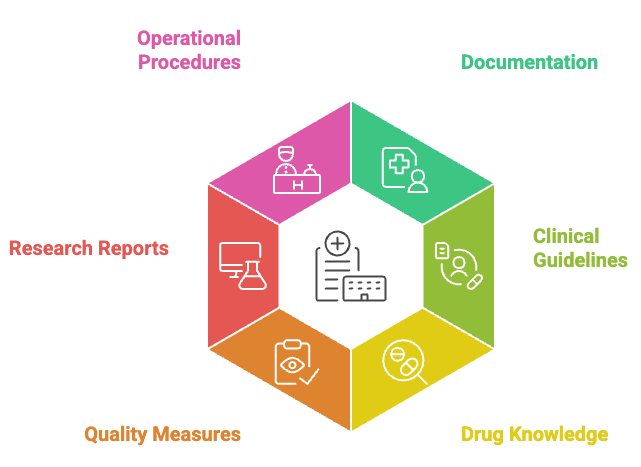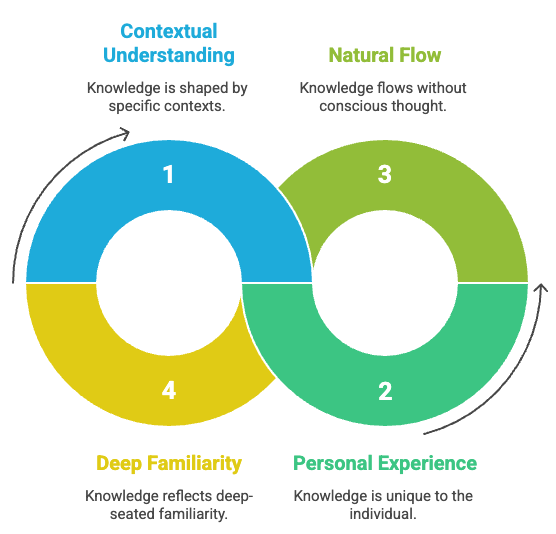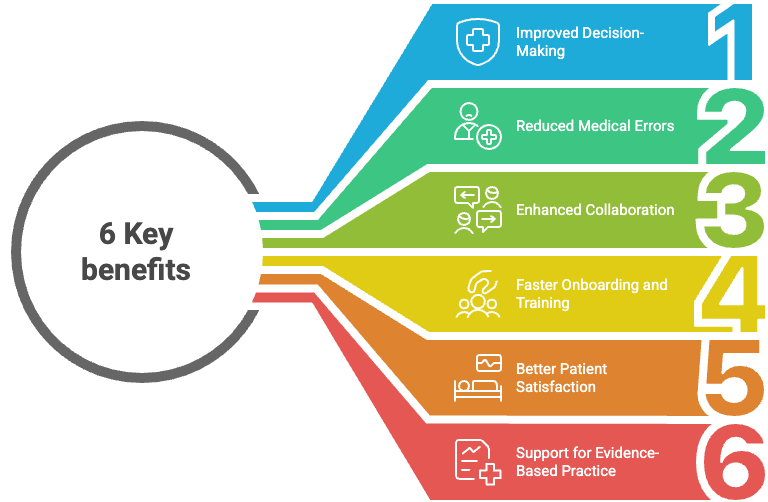Set up AI agents for customer support in less than 10 minutes
Set up AI agents in minutes
Why knowledge management in healthcare matters: A practical guide
Vaishali Jayaprakash .
Sep 2025 .

Healthcare services will touch the lives of roughly 67 million people in the UK. Customer experience in healthcare ranks among the bottom quarter of all industries.
Knowledge drives healthcare at its core. A patient's life could depend on medical staff having access to the right information at the right time.
Healthcare organizations benefit significantly from knowledge management systems. Medical professionals can deliver better care through improved decision-making and cooperative efforts. Medical teams worldwide needed quick access to share the latest research and data during the COVID-19 pandemic. This crisis highlighted knowledge management's crucial role in healthcare.
This piece explains the elements of successful healthcare knowledge management. You will discover its importance to your organization and learn ways to build systems that benefit both your team and patients.
What is knowledge management in healthcare?
Healthcare professionals deal with massive amounts of information each day. Organizations use knowledge management programs to create, capture, store, organize, and share knowledge. These systems help improve patient care through systematic creation, modeling, sharing, and translation of healthcare knowledge.
Definition and scope
Knowledge management in healthcare covers both health insurance operations and healthcare provider activities. The system has several knowledge types:
- Clinical knowledge (treatments, procedures, drug information)
- Administrative processes and policies
- Organizational best practices
- Patient-related information
- Research findings and evidence-based practices
Knowledge management helps decision-makers turn data into valuable structured knowledge assets. Its reach extends throughout the healthcare ecosystem, from individual practitioners to large hospital systems.
Types of knowledge: tacit vs explicit
Healthcare organizations work with two main types of knowledge:
Explicit knowledge represents information that professionals can easily document and share.
Healthcare's explicit knowledge includes:

Tacit knowledge represents the unwritten expertise professionals gain through experience. This knowledge differs from explicit knowledge because it:

Research shows up to 90% of an organization's knowledge exists as tacit knowledge. A doctor's ability to notice subtle signs of patient decline beyond vital sign readings exemplifies tacit knowledge in healthcare.
Why healthcare is a knowledge-driven industry
Healthcare stands out as knowledge-intensive. Medical knowledge grows daily with new studies, research, and drug developments. Medical professionals must learn continuously beyond their formal education to deliver quality care.
Quality healthcare services rely heavily on specialized knowledge. Approximately 5,627 registered hospitals operate in the U.S. with 12,440,670 employees. These professionals need constant training as treatments and procedures evolve.
Healthcare professionals face unique knowledge management challenges:
- System complexity
- Medical error consequences
- Rapid medical knowledge growth
- Rising healthcare costs
Healthcare decisions affect lives directly. Quick access to the right information can save lives. This makes effective knowledge management crucial for delivering quality care while managing costs.
Why knowledge management matters in healthcare
Healthcare faces a significant challenge. Medical knowledge flows massively and healthcare data grows exponentially. This growth creates far-reaching effects on healthcare delivery.
Information overload among clinicians
Doctors now face unprecedented pressure from information overload. Excess information raises doctors’ stress levels. This affects not just their comfort but their ability to perform.
Healthcare professionals struggle with several key issues:
- Information scattered across multiple systems
- Difficulty distinguishing relevant from irrelevant data
- "Note bloat" in electronic health records
- Regulatory documentation requirements
Need for timely and accurate decisions
Life and death often hang in the balance of quick healthcare decisions. Doctors must act fast with limited information during emergencies. Quality care depends on smart decision-making.
Traditional tools can't handle today's digital realities. The issue isn't just information overload - our systems fail to filter and show what matters most when needed.Time savings help more patients survive.
Healthcare organizations understand this challenge clearly. The right clinical data at the right moment helps them work effectively.
Impact on patient safety and outcomes
Knowledge management problems put patients at risk. Medical errors stem from poor knowledge sharing and access. Each year, misdiagnosed diseases leave 795,000 Americans permanently disabled or dead across care settings.
Better knowledge management leads to better patient outcomes. Studies link knowledge management systems to improved quality and patient safety. Strong patient-centered teamwork helps integrate knowledge better, which leads to better care.
Knowledge management helps build safety-focused organizational cultures. Different aspects of organizational culture create better knowledge management and patient safety.
Organizations with strong knowledge management systems see many benefits. They make better decisions, work together more effectively, reduce medical errors, and boost patient satisfaction. Combined with the right technology, knowledge management helps transform healthcare delivery and protect patients - the heart of healthcare's mission.
6 Key benefits of knowledge management in healthcare
Knowledge management systems work as powerful tools that help healthcare organizations optimize operations and patient care. The data shows six key benefits that showcase why knowledge management matters in healthcare.

1. Improved decision-making
Knowledge management boosts clinical judgment by giving healthcare professionals the right information when they need it most. Physicians make hundreds of decisions daily that affect patient health. Good knowledge systems let providers access patient records, medical journals, and treatment plans to make better decisions. Quick access to accurate information leads to informed choices that result in better care outcomes.
2. Reduced medical errors
Medical errors remain one of the most important challenges. Studies show that 80% of these mistakes happen because teams don't share or can't access knowledge properly. Good knowledge management systems help by:
- Making standardized protocols and evidence-based guidelines available quickly
- Reducing medication errors
- Making sure care procedures stay consistent between shifts
- Warning physicians about risks like adverse drug interactions
Research shows that computerized physician order entry systems cut serious medication errors by 55%. Hospitals that use reliable knowledge management strategies report fewer medical errors and safer patient care.
3. Enhanced collaboration among staff
Better healthcare collaboration leads to better patient outcomes through optimal medication dosages and lower morbidity rates. Knowledge management eliminates information silos and helps departments communicate better. Good teamwork centered on patients connects with better knowledge sharing, which teams need to perform well. Teams with different specialties work together to deliver high-quality patient care.
4. Faster onboarding and training
Hospital staff waste their time looking for information in disconnected systems. Knowledge management fixes this by putting all training materials and procedure documents in one place. New employees often depend on word-of-mouth instructions or scattered files, but a good knowledge management system provides clear procedures that experienced staff already use. This approach makes training easier, keeps institutional knowledge intact when staff changes roles, and maintains consistent practices across departments.
5. Better patient satisfaction
Patient satisfaction with healthcare contact centers may be low because of long waits and unsolved problems. Knowledge management systems make patient experience better by keeping communication consistent at every touchpoint. Teams can answer questions faster and more consistently when information stays centralized, which reduces patient frustration. Knowledge management practices boost both quality and productivity in healthcare.
6. Support for evidence-based practice
Evidence-based practice combines individual clinical expertise with the best research evidence. Knowledge management helps by making current research available during patient care. Digital platforms show great promise for supporting and sharing knowledge between healthcare professionals in clinical settings. Knowledge management makes nursing more valuable in healthcare organizations by sharing and applying knowledge to ensure quality care in ever-changing environments.
How to implement knowledge management in healthcare settings
Healthcare organizations need a well-laid-out approach that balances technical and human factors to implement knowledge management successfully. A step-by-step process makes all the difference.
Assessing organizational needs
Your organization's specific pain points need a review before you introduce any knowledge management system. Define what success means to you it could be faster onboarding, fewer errors, or better regulatory compliance. This original assessment helps you:
- Identify critical knowledge to capture
- Determine processes that need improvement
- Balance your efforts across people, processes, and technology
Your organization should define how to measure "value" to justify the investment in knowledge management tools.
Building a cross-functional team
Team performance links strongly to knowledge integration. The right implementation team makes a big difference. Create a diverse group with clinicians, IT staff, and administrators. These mixed teams develop more creative solutions and make better decisions.
Your team should:
- Have staff from all shifts, including nights and weekends
- Include "champions" who can promote the change
- Work without hierarchy so everyone contributes
Choosing the right KM tools
Pick technology that makes knowledge flow smooth throughout its lifecycle. Look for tools with user-friendly interfaces and smart search features. Technical features matter, but your main goal should be finding a system that fits your healthcare processes.
Integrating KM into daily workflows
Staff will skip using your knowledge management system if it feels like extra work. The system should match existing workflows instead of forcing teams to change how they work. You can do this by:
- Adding knowledge search to current dashboards
- Using tags that match internal terminology
- Creating connections within clinical workflows
Training and change management
Good change management determines the success of any knowledge system. Staff needs clear communication about changes and personal benefits. Show them "what's in it for them" to get their support.
Get stakeholders involved early. Healthcare professionals might resist new workflows because of patient safety concerns. Keep track of staff satisfaction and patient outcomes to show progress.
A good knowledge management system boosts decision-making and reduces errors by doing this and being organized. This leads to happier staff and better patient care.
Common challenges and how to overcome them
Healthcare organizations struggle to implement knowledge management smoothly. Your organization can prepare better by understanding these common roadblocks.
Resistance to change
Healthcare professionals resist new knowledge systems with good reason. Several key factors behind this resistance:
- Job security worries and fear of unknown changes
- No involvement in planning
- Changes to existing workflows
Nurses show resistance through fear, uncertainty, doubt, frustration, and confusion. Here's how to handle this resistance:
- Let staff participate in planning instead of forcing changes
- Share information about changes early
- Show direct benefits to patients and staff
- Offer role-specific training programs
Lack of leadership support
Strong leadership drives successful knowledge management through consistent planning, monitoring, and support. KM initiatives often fail without proper backing from leaders. Half of all nurses report their leaders don't support knowledge management properly.
These steps can close leadership gaps:
- Leaders should demonstrate desired behaviors
- Pick influential staff members as change champions
- Give leaders specialized knowledge management training
Technology limitations
Common technical issues include:
- Poor network coverage in rural areas
- Different systems across facilities that don't work together
- Tools that clash with daily work routines
Healthcare professionals should help develop and implement knowledge tools. They need better technical skills and reliable support.
Cultural barriers to knowledge sharing
Traditional department silos in healthcare block knowledge sharing. Other barriers include:
- Communication problems due to language differences
- Staff too busy to document knowledge
- Concerns about patient data privacy
Organizations need cultures built on trust and teamwork. Clear written guidelines help staff share knowledge. Strong privacy rules protect patient data while allowing necessary information flow.
Key takeaways on knowledge management in healthcare
Knowledge management is crucial for modern healthcare organizations. Healthcare professionals deal with massive amounts of data every day. A good knowledge system helps them make decisions that save lives. Organizations gain huge benefits from organizing, sharing and using critical information properly.
Good knowledge management leads to fewer medical errors and better patient outcomes. The proof is clear. Teams work better when they can access standard protocols and evidence-based guidelines easily. On top of that, new staff members learn quicker and deliver consistent care with centralized resources ready to use.
Setting up these systems comes with its share of challenges. Staff might push back against changes. Leaders' support could fade. Technical problems pop up, and workplace culture can block knowledge sharing. But these hurdles become easier to handle with proper planning, mixed teams, and systems that blend naturally with current workflows.
Healthcare's future depends on how organizations handle their most valuable asset – knowledge. Patients deserve care that uses the latest evidence and best practices. The staff needs tools that simplify their jobs instead of making them more complex. A good knowledge management system changes healthcare delivery by getting the right information to the right people when they need it.
Quick Summary: Knowledge management in healthcare
Knowledge management (KM) is critical in healthcare because patient safety depends on timely, accurate information. With growing data, complex systems, and rising costs, effective KM helps reduce errors, improve decisions, and enhance collaboration.
Key benefits:
- Smarter decisions with quick data access
- Fewer medical errors via standardized protocols
- Better teamwork across departments
- Faster training and onboarding
- Higher patient satisfaction
- Stronger support for evidence-based care
Implementation:
Assess needs, build cross-functional teams, pick user-friendly tools, integrate KM into daily workflows, and manage change with clear communication.
Challenges:
Resistance to change, weak leadership support, tech gaps, and cultural barriers—but these can be overcome with planning, training, and teamwork.
Takeaway:
Strong KM systems turn overwhelming data into actionable insights, leading to safer, more efficient, and patient-centered healthcare.
Frequently Asked Questions
MORE LIKE THIS
Support made easy. So your team can breathe.






